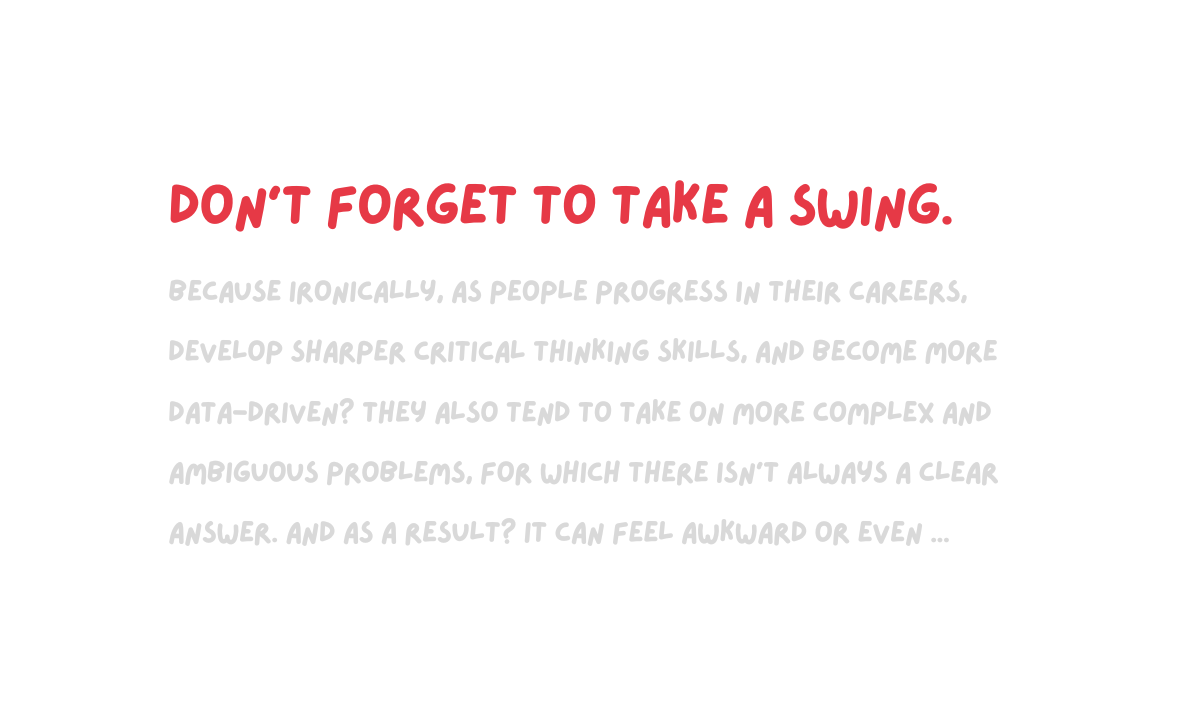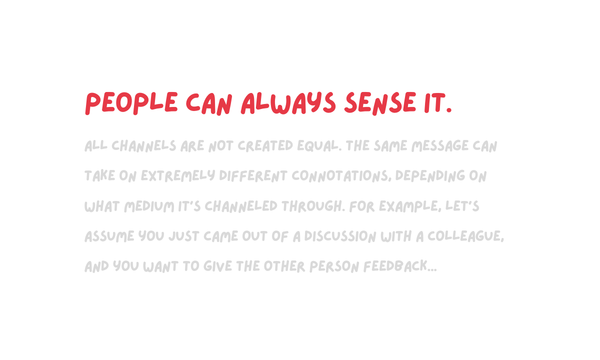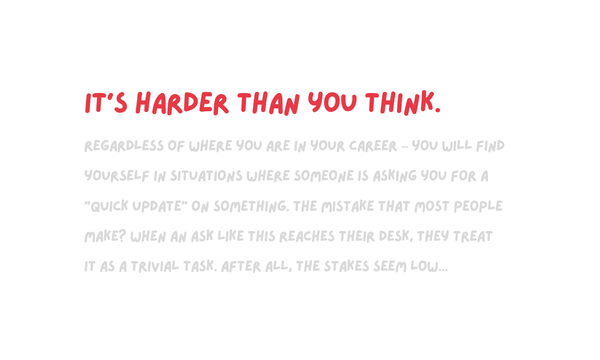The mistake that (mostly) experienced people make

I started learning tennis a few years ago. And boy, it was a rough start.
Because at first? I could barely hit the ball. And for the ones I managed to hit, few of them actually landed inside the court. It was frustrating.
While I knew that I had many issues to fix, I wasn't sure where to start.
So naturally, I focused on adjusting my swing. I assumed it had to do with my grip, my wrist, my arms, my timing... or all of the above.
As it turns out? I wasn't wrong.
But I did miss one important thing – which I didn't realize until much later.
I had no footwork.
In retrospect, it was obvious why I struggled.
Because if I wasn't getting to the right spot to begin with? Having the perfect swing didn't really matter.
And funnily enough, I see a parallel of this problem at work – especially for people in the early stages of their careers.
That mistake?
Making assertions (i.e. "swinging the racket") based on gut feel – without the critical thinking skills to back it up with evidence (i.e. "applying good footwork").
But here's the plot twist: at some point, a different problem emerges.
Because as people gradually become more adept at gathering data, extracting insights, uncovering evidence, and preparing artifacts...
...they sometimes forget to turn it into a point a view.
Or, to continue the analogy: they've finally perfected their footwork – and have now forgotten to actually "take a swing."
The paradox, explained
This is a somewhat paradoxical, yet very real problem.
Because ironically, as people progress in their careers, develop sharper critical thinking skills, and become more data-driven?
They also tend to take on more complex and ambiguous problems, for which there is rarely a clear answer.
And as a result? It can feel awkward or even wrong to "take a swing" at things and put forth a point of view, given the level of rigour and clarity people are used to.
But the thing is this: in the face of complex problems, the data we gather is rarely perfect. The benchmarks we have are rarely exhaustive. The evidence we gather is rarely conclusive.
And so, with the penchant for perfection we've developed over the years? We shy away from making assertions or generating hypotheses.
Instead, we go back to the drawing board. We get stuck trying to find the perfect footwork – and we never take a swing.
An example, with lemonade
Let's illustrate this with an example.
Imagine that I run a lemonade stand in my backyard. Business started out ok, but sales have stagnated recently.
As a result, I'm now facing a couple important decisions:
- What can I do to improve things?
- Or Should I just shut things down?
Naturally, we want to collect intel to inform decision-making. Imagine, then, that we end up with the following artifacts:
- Research shows that the beverage market isn't growing.
- Most of my neighbors buy a cup every single day.
- Sales doubled when I gave 20% off last month – but only for a week.
- My friends tell me that alcoholic lemonade is the new thing.
- My sales are 3 times higher on sunny days.
OK, but what now? There's no clear-cut answer. The evidence doesn't clearly suggest one direction over the other.
Should we shut things down? Not necessarily. Artifact #2 and #3 suggest there is real demand. Artifact #4 suggests that maybe I just need to pivot.
Then should we double-down? Not quite either. Artifact #1 is not all that encouraging. Artifact #3 can be read with a "glass half empty" lens. Artifact #5 doesn't help at all.
Heck, maybe the right data isn't even here. Maybe we need to keep digging.
As a result? We try to do more fact-finding. Because maybe – just maybe – we'll eventually find evidence that will give us a clear-cut answer.
So we end up spinning. And we never end up "taking a swing."
The hypothesis-driven approach
While this is a slightly exaggerated example, the point is this: there's nothing wrong with demanding rigour when it comes to analysis.
However, there is a problem with the inability to take a hypothesis-driven approach to problem-solving.
Because in this example? What we saw was an attempt to collect intel on anything and everything. There was no hypothesizing. And there was no intentionality associated with the fact-finding process.
Instead, we ended up with tons of tangential artifacts, but no clear direction.
(And we still have no point of view.)
But consider a different approach, where we push ourselves to develop hypotheses first, e.g. –
- Hypothesis #1: We have already maxed out our neighborhood, and there is very little untapped headroom.
- Hypothesis #2: The market is saturated with competition, and our profits are on par with the top lemonade stands already.
- Hypothesis #3: Lack of awareness is a key issue hampering our growth; investing could bring incremental sales.
Suddenly, there's a bit of direction and intentionality. There's a viable path towards establishing a point of view.
Most importantly? There's clarity over what artifacts actually matter. You're not longer just fact-finding aimlessly.
But you can only get to this stage – if you start with the right hypotheses.
In other words, you will find yourself going down a rabbit hole – if you do not exercise the discipline of chasing hypotheses, instead of chasing facts.
Because there will always be more data, more granular data, and more exhaustive data.
But the best operators? They know that there is never going to be a perfect answer. And that's OK.
They always remember to take a swing.
🧠 Thanks for reading Herng's Newsletter this week! If this was forwarded to you, join 4500+ readers and subscribe for free here.


